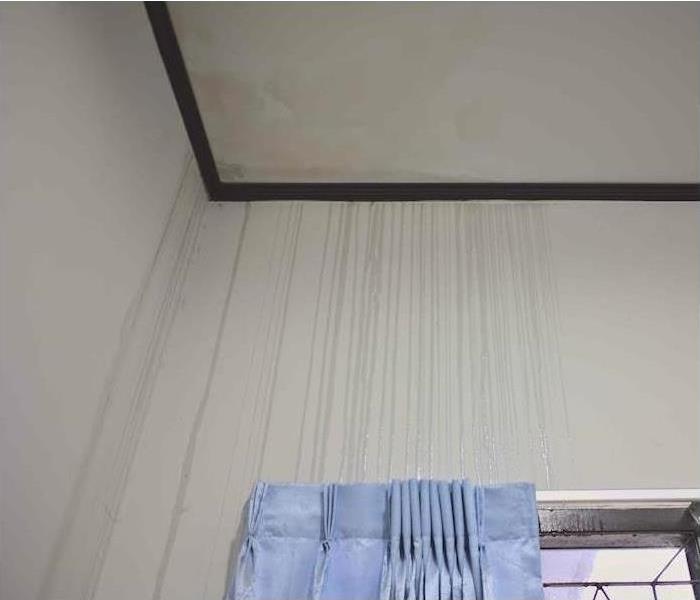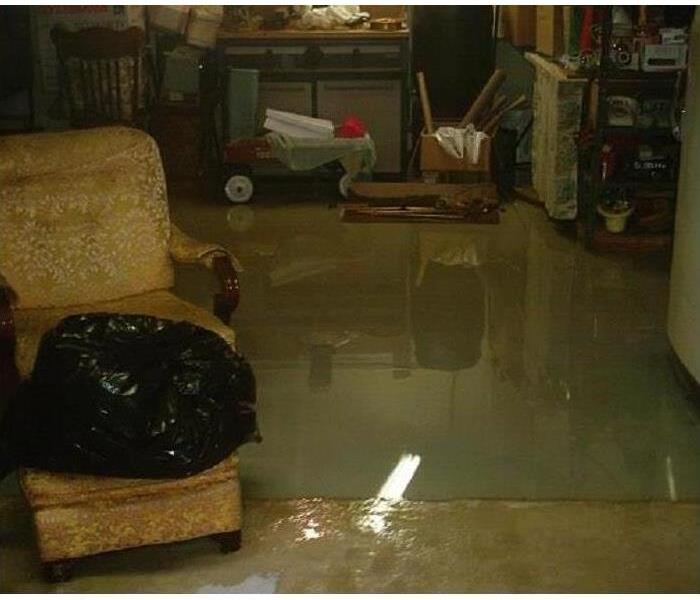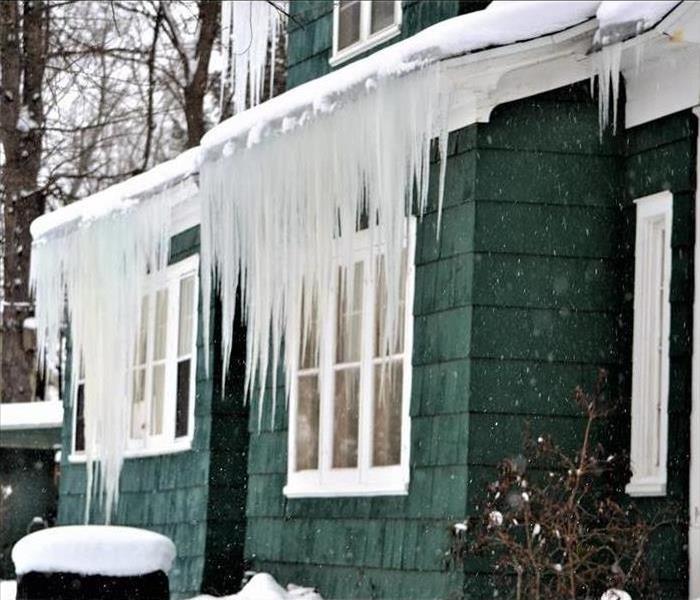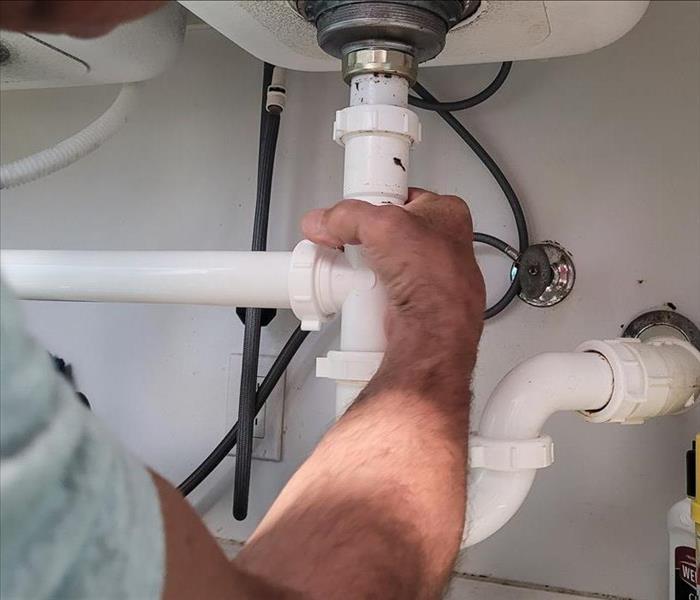Preventing Water Damage in Your Home Starts Here
5/3/2024 (Permalink)
 It’s important to educate yourself about home systems that are designed to prevent water from entering your home.
It’s important to educate yourself about home systems that are designed to prevent water from entering your home.
The perks of owning your own home are great but it also brings a lot of responsibility. Homes are built in a way to provide maximum protection from water intrusion but sometimes those methods fail.
It’s important to educate yourself about home systems that are designed to prevent water from entering your home. Here are some of the most common points of failure in a home that could allow water to go where it shouldn’t:
- Faucets and Sinks. Faucets and sinks are places to check for leaks. Over time, the rubber gaskets in faucets can degrade which can lead to leaks. Sink drains are usually sturdy unless you have a clog and use too much plunger pressure to remove it. Too much pressure from plunging can damage seals, so always use caution.
- Disposals. Garbage disposals are one of the hardest working appliances, and they can spring a link. If you believe you have a leak, check out these tips for finding it.
- Gutters and Downspouts. Gutters and downspouts should be clean and free flowing. They should be inspected regularly and cleared of obstructions and debris. Downspouts should move water at least 30 inches away from the home, and the soil should also flow away from the home.
- Roof Damage. Falling limbs from trees are a real risk to roof systems. They can perforate the roof and damage or clog gutters. Shingles are especially susceptible to falling tree damage. Newer shingles are designed and constructed to be impact-resistant, hopefully reducing the need for expensive roof repairs. But shingles degrade over time, and a falling tree or limb can easily damage an aged shingle.
- Sewer Line Obstruction. This is a serious issue and usually takes a professional plumber to resolve it. Sewer lines can clog for a number of reasons, but two of the most common are root intrusion and grease buildup.
- Sump Pump Defect. A sump pump is designed to move water from a basement or crawlspace to outside the home into a drainage system. When a sump pump fails, water backups can affect your home quickly.
Sump Pump Maintenance Matters
12/27/2023 (Permalink)
 If your sump pump does fail, call the trained and certified SERVPRO® technicians.
If your sump pump does fail, call the trained and certified SERVPRO® technicians.
You probably don’t think about your sump pump often, but conducting simple regular maintenance can help prevent flood disasters.
Once a year, disconnect the pump from the power source and remove the unit. Flush it thoroughly with water to remove impurities and debris. While you have the pump out, also clean debris from the sump pit. Reinstall the pump and reconnect the power source. Test the unit by pouring a bucket of water into the pit and making sure the pump starts.
If your unit has backup battery power, replace the battery every two to three years, or as directed by the manufacturer. Always refer to your pump’s instruction manual for specific information about maintenance and operation. More information about sump pumps is available from the Sump and Sewage Pump Manufacturers Association.
If your sump pump does fail, call the trained and certified SERVPRO® technicians. Our mitigation crew will come out and dry any affected areas and perform any other cleanup to get your home back to preloss condition.
Winter Water Damage
12/19/2023 (Permalink)
 With below freezing temperatures, snow, and ice, your home or business could be in jeopardy of water damage.
With below freezing temperatures, snow, and ice, your home or business could be in jeopardy of water damage.
Michigan winters are known to be brutally cold and large amounts of snow are always expected. With below freezing temperatures, snow, and ice, your home or business could be in jeopardy of water damage. It is crucial that you are aware of the hazards and can prepare, prevent or act quickly if faced with winter water damage.
FROZEN PIPES
A frozen pipe can burst at the point where the ice blockage inside the pipe is located, but typically the rupture is caused by the backflow pressure between the water source and the blockage. A burst pipe can cause considerable damage to your property if not addressed quickly.
ICE DAMS
Ice dams can be a major problem during the winter season. They form when heated air melts roof snow downward into water dammed behind still-frozen ice. When the trapped water cannot safely flow or run into the gutter system, it can backflow under the roof ’s shingles and into the structure’s interior areas.
Cold weather, snow, and ice storms can cause severe damage to your home or business. When these types of disasters strike, immediate action is necessary to prevent additional damage to your property. Our team has winter storm experience, expertise, and the resources to remediate damage caused by winter weather. If disaster strikes your home or business during the winter months, know that SERVPRO® has your back.
Potential Water Damage in a Home
8/30/2023 (Permalink)
 From leaking pipes to defective appliances, it is crucial to recognize potential water damage causes in a home.
From leaking pipes to defective appliances, it is crucial to recognize potential water damage causes in a home.
From leaking pipes to defective appliances, it is crucial to recognize potential water damage causes in a home. Read below to learn about the potential water damage hazards and learn how to avoid them.
- Dishwasher - Your dishwasher can cause water damage if not properly sealed, the latch is broken, or if it is loaded with the wrong soap. Make sure any leaks are immediately addressed and your dishwasher is repaired or replaced if you see water pooling on the floor after running a dishwasher.
- Air Conditioner - Your air conditioner removes moisture from the air and moisture can build up within the unit itself. If not properly drained, that water could slowly leak into your home and could potentially cause water to seep into the drywall and flooring. Allowing water to sit untreated can introduce mold, which requires an emergency water cleanup situation.
- Clogged Drains - Clogged drains aren’t just annoying—they also cause water damage and mold growth if left unchecked. A clogged toilet can cause water to back up into the shower, sinks, or bathroom floor with potentially hazardous water. Sewer water is extremely dangerous because it contains raw sewage and bacteria, requiring help from water damage cleanup companies.
If you experience water damage from any of these issues in your home, SERVPRO® of West Sterling Heights has the proper equipment and experience to get your home back to pre-water damage condition.
 It’s important to educate yourself about home systems that are designed to prevent water from entering your home.
It’s important to educate yourself about home systems that are designed to prevent water from entering your home.




 24/7 Emergency Service
24/7 Emergency Service


